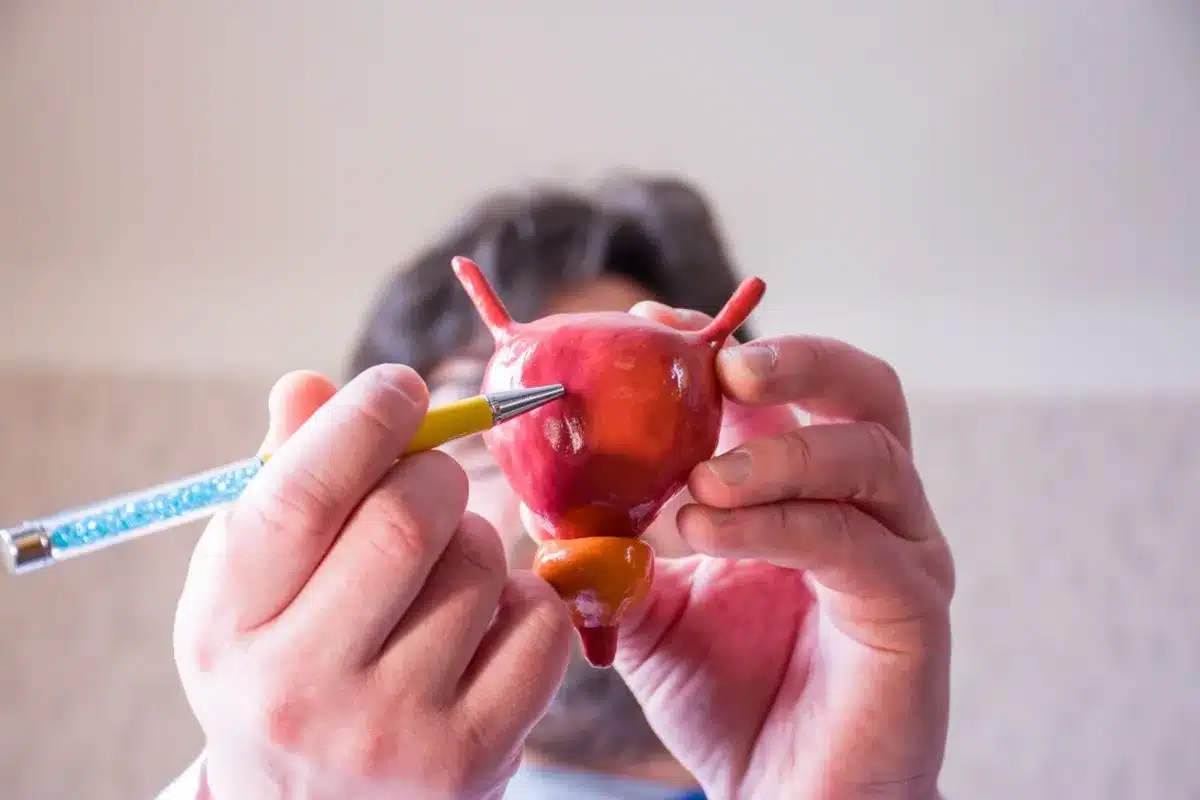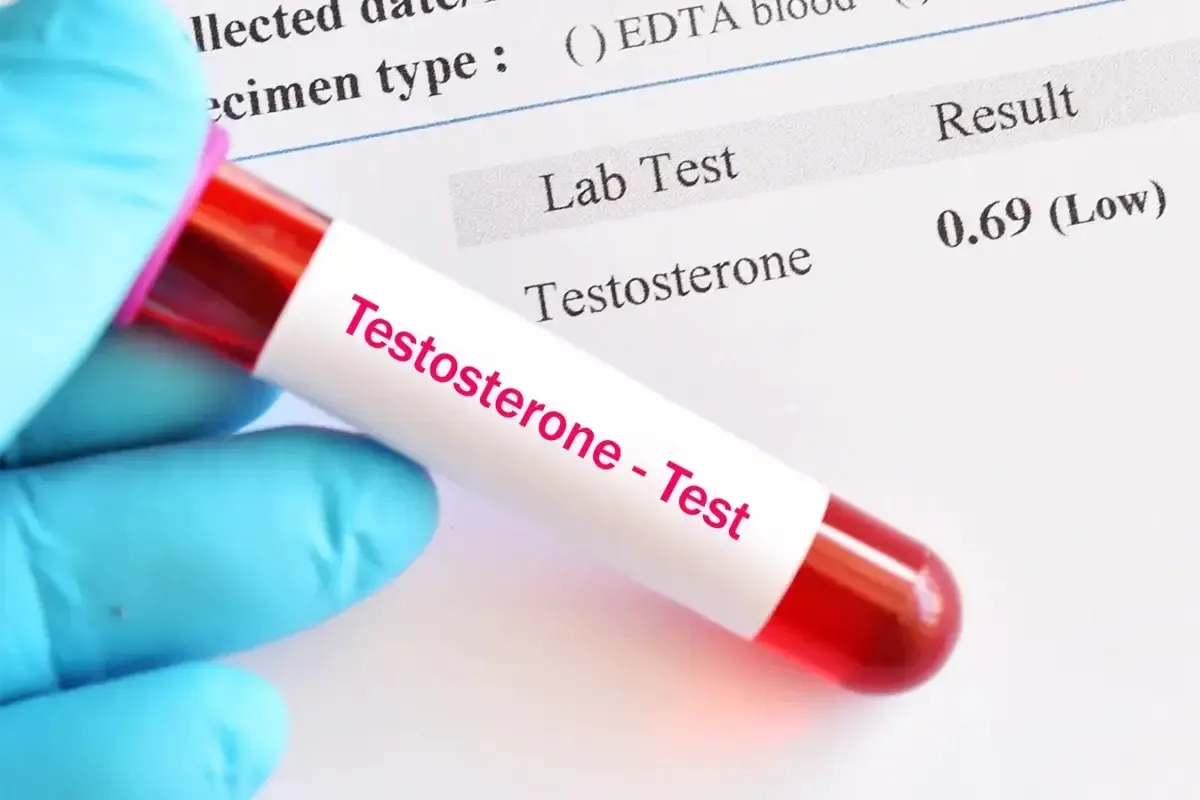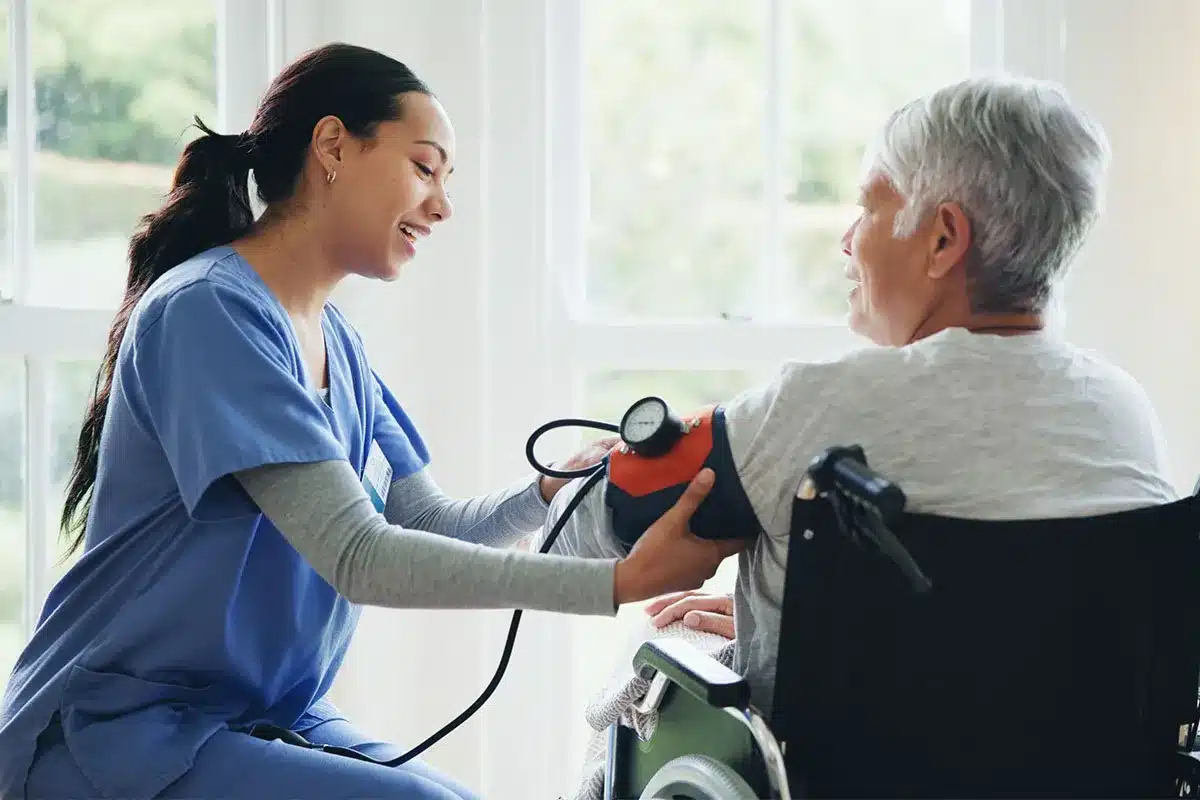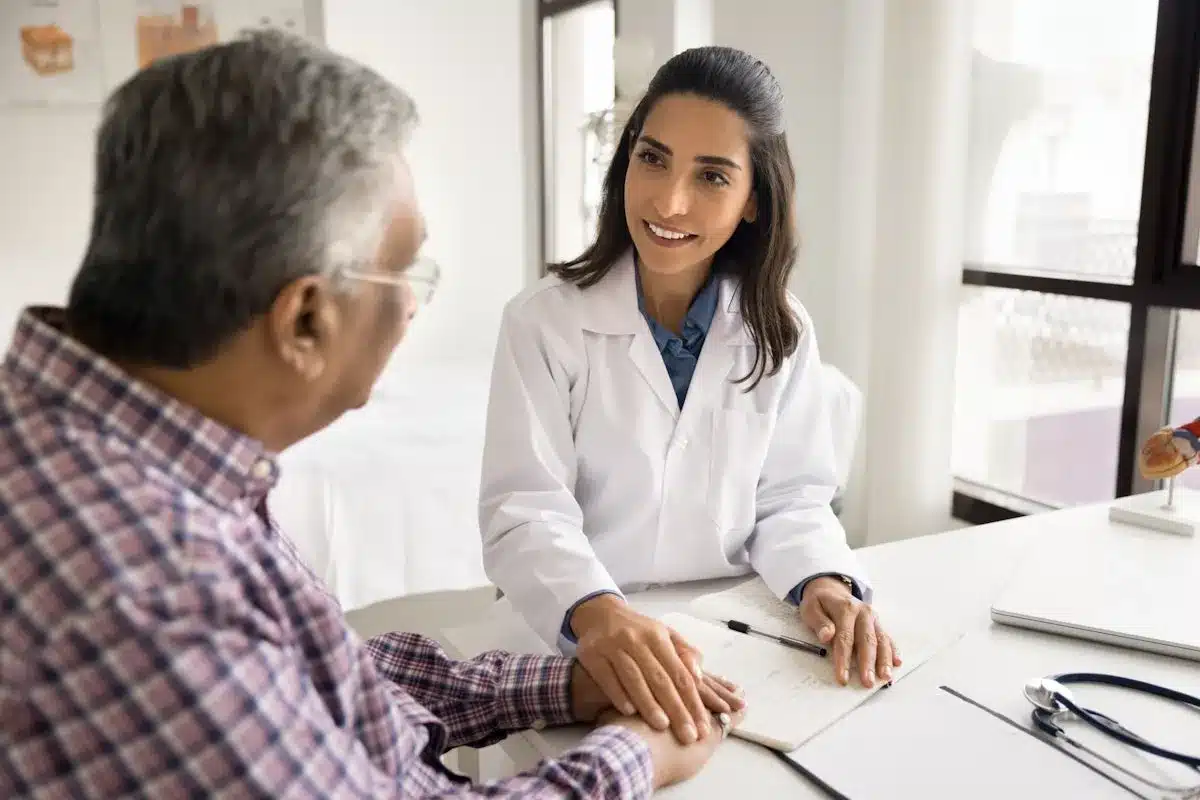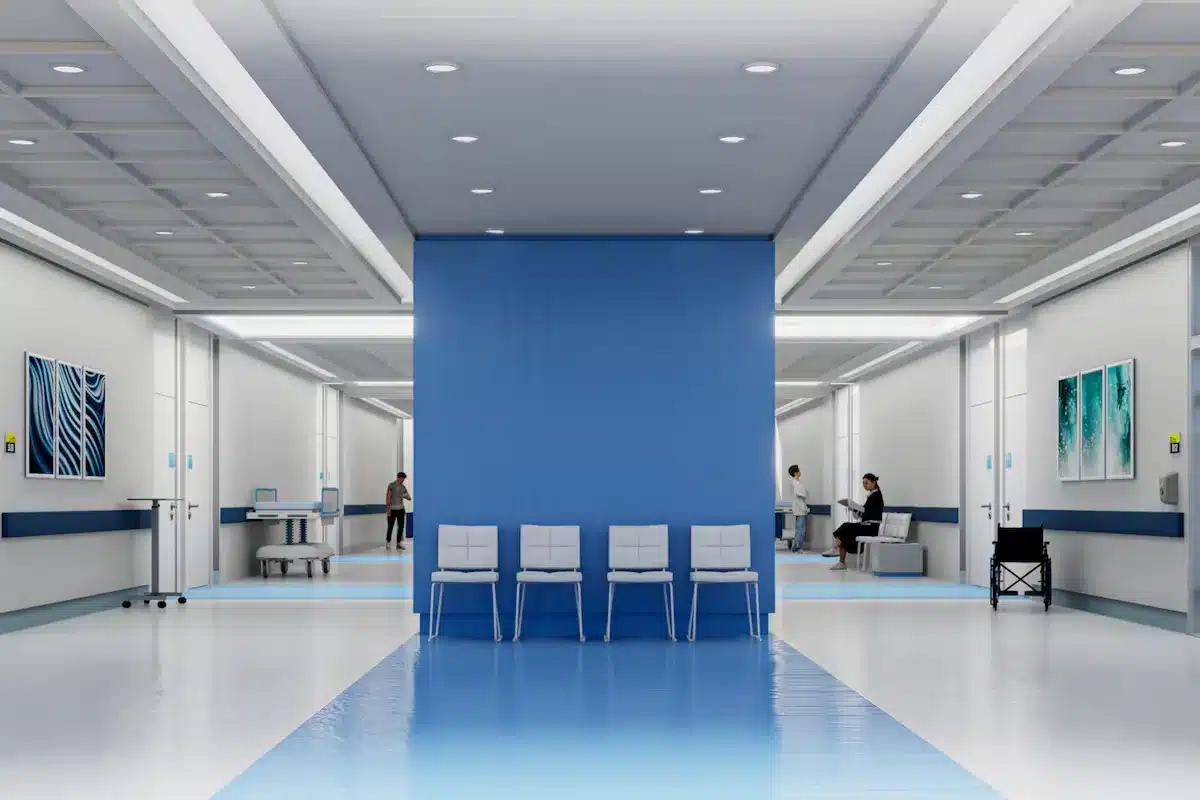Getting a cancer diagnosis can feel overwhelming. You might have many questions about what’s next. Nearly 1.9 million people are diagnosed with cancer in the United States each year. Knowing what to expect at your first oncology appointment can help ease some of the uncertainty. Patients often ask, “What happens at your first oncology appointment? since understanding the process can reduce stress and prepare them for this important step.
Your initial meeting with a cancer specialist is a key part of your treatment journey. It’s a chance to talk about your diagnosis, treatment options, and what’s ahead. Being ready for this appointment can greatly impact your care.
Key Takeaways
- Understanding your diagnosis is key for your treatment plan.
- Your first oncology appointment is a time to ask questions.
- A treatment plan tailored to you will be created.
- You’ll discuss possible side effects and how to handle them.
- You’ll learn about support systems and resources available to you.
Understanding Oncology and the Role of an Oncologist
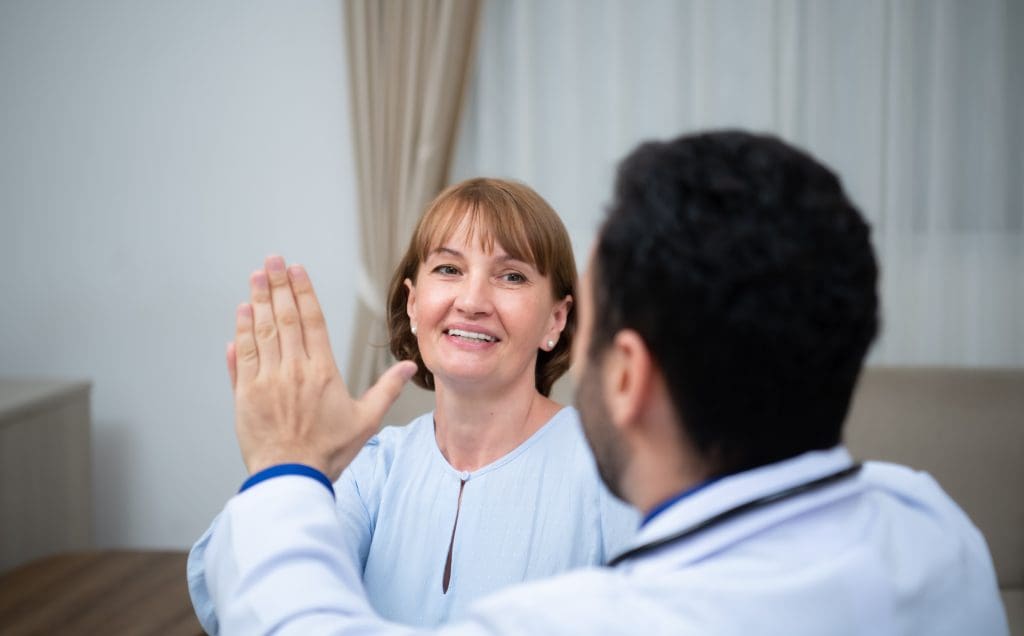
It’s important for patients with cancer to know about oncology and oncologists. Oncology is the medical specialty that deals with the diagnosis, treatment, and study of cancer. Oncologists have the skills to identify and understand different cancers.
What is oncology and what do oncologists specialize in?
Oncology is a branch of medicine focused on cancer. Oncologists study and treat cancer. They understand cancer’s causes, how it grows, and treatment options.
You might see an oncologist who treats many cancers or one who specializes in certain types.
Types of oncologists you might meet
There are several types of oncologists. Medical oncologists use chemotherapy and other medicines to treat cancer. Radiation oncologists treat cancer with radiation. Surgical oncologists remove tumors surgically.
The multidisciplinary cancer care team
Cancer care involves a team of healthcare professionals. This team includes oncologists, nurses, and radiologists. They work together to provide care from diagnosis to follow-up.
The oncologist leads the team. They coordinate care and create a treatment plan for each patient.
Why You’ve Been Referred for an Oncologist Consultation
When a doctor refers you to an oncologist, it’s because they think you might need special cancer care. This is a key step in figuring out if you have cancer or need help managing it.
Common Reasons for Oncology Referrals
There are many reasons to see an oncologist. These include odd test results, symptoms that might be cancer, or a history of cancer. Tests like biopsies, CT scans, MRIs, and blood tests often lead to referrals.
A Cancer Society says, “If your doctor thinks you might have cancer, or if you already do, you’ll see an oncologist.”
What Your Referral Means (and Doesn’t Mean)
Getting a referral to an oncologist doesn’t mean you definitely have cancer. It means your doctor wants a second opinion to understand your health better. Oncologists are experts in all things cancer.
The Referral Process Explained
First, your primary doctor or another healthcare provider sends your medical records to the oncologist. This includes test results, your medical history, and other important documents. Then, the oncologist looks over this information before you meet.
| Step | Description |
| Initial Assessment | Your doctor checks your condition and decides if a referral is needed. |
| Referral Made | Your doctor sends you to an oncologist with your medical records. |
| Oncologist Consultation | You meet with the oncologist, who reviews your records and does more checks. |
Knowing how referrals work can make you feel less worried about seeing an oncologist. It’s a step towards getting the care you need.
Emotional Preparation for Your First Appointment
Getting a cancer diagnosis can feel overwhelming. But, preparing for your first oncology appointment can help. It’s normal to feel anxious or unsure about what’s next. Being emotionally ready can greatly impact how you face this tough time.
Managing Anxiety and Expectations
It’s important to manage your anxiety before your first oncology appointment. Breathing exercises and mindfulness techniques can calm your nerves. Also, setting realistic expectations about the appointment can help.
Remember, it’s okay to feel overwhelmed and you’re not alone. Many find comfort in support groups. These groups let you share your story and learn from others.
Mental Preparation Strategies
Mental preparation is key for your first oncology appointment. Writing down your questions and concerns can make you feel more in control.
Also, visualization techniques can help manage anxiety and keep a positive mindset.
Support Resources Available to You
Many support resources are available to help you. From counseling services to online forums, there’s support for everyone.
| Support Resource | Description |
| Counseling Services | Professional guidance to help cope with emotional challenges |
| Online Forums | Community support where you can share experiences and advice |
| Support Groups | Group meetings to discuss challenges and share coping strategies |
Remember, you’re not alone as you prepare for your first oncology appointment. Reaching out for support and using available resources can greatly help your journey.
Practical Preparation for Your First Visit
Going to see an oncologist for the first time is a big step. Getting ready well can make your visit more effective.
Medical Records and Information to Gather
It’s important to collect your medical records before your first oncology visit. This includes test results, biopsy reports, and your medical history. Organizing these documents helps your oncologist understand your situation better.
Insurance and Payment Considerations
Knowing what your insurance covers is key. Find out what’s included and what’s not. Also, ask about any costs you might have to pay. Talking about money worries with the staff can clear things up.
What to Bring with You
Bring a list of your medicines, questions for your oncologist, and someone for support. Having someone with you can help you remember what was said.
Logistics: Location, Parking, and Timing
Plan your visit by knowing where the oncology department is, where to park, and when to arrive.
Who Should Accompany You
Going to your first oncology appointment can feel scary. But, having someone you trust by your side can really help. A family member or close friend can offer emotional support and help you stay focused.
Benefits of Bringing a Support Person
Having a support person at your appointment is very helpful. They can help you ask questions and take notes. This way, you won’t miss any important details, which can be easy to forget in a stressful setting.
Role of Your Companion During the Appointment
Your companion’s role goes beyond just emotional support. They can also help you gather information and remember what was discussed. They can explain the diagnosis, treatment options, and what comes next.
When to Consider Bringing Family Members
Think about who can offer emotional support and help you understand the information. Family members can be comforting, but remember their feelings too. It’s important to consider their emotional well-being during the appointment.
The Initial Oncology Appointment Structure
Your first oncology appointment is a detailed process. It includes administrative tasks and meeting your oncology team. Knowing what to expect can help you prepare.
How long is the first oncology appointment?
Your first oncology appointment can last two to three hours. This time covers administrative tasks, consultations, and initial tests.
Administrative procedures and paperwork
First, you’ll do administrative tasks. This includes registering, filling out paperwork, and checking your insurance. Arriving early helps you avoid feeling rushed.
Meeting the oncology team
Meeting the oncology team is a key part of your appointment. You’ll meet oncologists, nurses, and other specialists. They will discuss your medical history, diagnosis, and future care.
Typical appointment flow
Your appointment will follow this order:
- Initial consultation with your oncologist
- Review of your medical history and current condition
- Discussion of diagnostic tests and treatment options
- Meeting with nurses for additional support and guidance
| Appointment Component | Description | Estimated Time |
| Administrative Procedures | Registration, paperwork, insurance verification | 30 minutes |
| Consultation with Oncologist | Review of medical history, discussion of diagnosis and treatment | 60-90 minutes |
| Nursing Support | Additional guidance, support, and answering questions | 30-60 minutes |
Knowing what your first oncology appointment entails can ease your anxiety. Being ready for each step helps you get the most from your time with the team.
What Does an Oncologist Do on First Visit?
On your first visit, the oncologist will do a detailed check to find the best treatment for you. This first meeting is key to understanding your health and creating a treatment plan just for you.
Review of Your Medical History
The oncologist will start by looking over your medical history. This includes any past health issues, treatments, and test results. This info helps them understand your current health and find the best treatment for you.
Key components of your medical history review include:
- Previous cancer diagnoses or treatments
- Family medical history
- Current medications and supplements
Physical Examination Components
A physical exam is a big part of the first visit. The oncologist will do a detailed check to see how you’re doing overall. They’ll look for any signs or symptoms related to your cancer.
The physical examination may include:
- Vital sign checks
- Examination of the affected area
- Assessment of lymph nodes and other relevant body systems
Discussion of Symptoms and Concerns
You’ll also get to talk about your symptoms and worries with the oncologist. This talk is important to understand your situation and answer any questions or fears you might have.
Be prepared to discuss:
- The nature and severity of your symptoms
- Any changes in your symptoms over time
- How your symptoms are affecting your daily life
Initial Assessment and Explanation of Findings
After reviewing your history, doing a physical exam, and talking about symptoms, the oncologist will share their first thoughts on your condition. They might explain your diagnosis, talk about possible treatments, and tell you what’s next in your care.
The oncologist will work with you to make a treatment plan that fits your needs and situation.
Diagnostic Tests and Procedures
Diagnostic tests are key in your first oncology visit. They help create a treatment plan just for you. These tests show how big and what kind of cancer you have. This lets your doctor plan the best treatment.
Common Tests Ordered at First Appointments
At your first visit, the doctor might order several tests. These include:
- Blood tests to check for tumor markers or other health indicators
- Imaging tests like X-rays, CT scans, MRI scans, or PET scans to see the tumor or affected area
- Biopsies to look at tissue samples for cancer cells
Understanding the Purpose of Each Test
Each test has its own purpose. Blood tests look for proteins or markers linked to cancer. Imaging tests give clear pictures of your body’s inside. They help find tumors and see how big they are. Biopsies are key in diagnosing cancer by looking at cells directly.
What to Expect During Testing
Tests can vary in what you’ll experience. Blood tests need a needle prick to take blood. Imaging tests ask you to stay very quiet in a machine that takes pictures of your body. Biopsies might be a small surgery to get tissue samples. Always follow any instructions from your healthcare team to get accurate results.
Timeframe for Receiving Results
How long it takes to get results varies. Blood tests might give results in a few hours or days. Imaging tests and biopsies can take longer, sometimes up to a week or more. This depends on how complex the test is and the lab’s work. Your oncologist will tell you when to expect your results and what to do next.
Knowing about the diagnostic process can make you feel less anxious about cancer diagnosis and treatment. By understanding what’s happening, you can prepare better for what’s to come.
Treatment Discussions and Difficult Conversations
Treatment talks are key in your first oncology visit. Your oncologist will explain the treatment plans for your cancer. They will talk about how well these plans might work and any side effects.
How Treatment Plans Are Developed
Creating a treatment plan is a detailed process. It looks at your medical history, cancer type and stage, and other health factors. Your oncologist will discuss options like surgery, chemotherapy, or radiation. They will explain why they suggest each one.
Discussing Prognosis and Survival Rates
Talking about your prognosis and survival rates is a big part of your first visit. Your oncologist will share what they think about your disease’s outcome. They will consider your unique situation and cancer details.
Do Oncologists Tell You How Long You Have to Live?
Discussing how long you might live is tough. Honesty in cancer care is important, but it’s a sensitive topic. Oncologists try to be honest and supportive at the same time.
Addressing Concerns About Honesty in Cancer Care
Patients often wonder if their oncologist will be honest about their prognosis. It’s important to know that oncologists want to be open. They aim to give you the info you need to make choices, while also supporting you.
Conclusion: Next Steps After Your First Oncology Appointment
Having cancer can be scary and uncertain. After your first oncology appointment, you might wonder what’s next. The first meeting is just the start of your journey with cancer.
Your oncologist will have ordered tests to see how far your cancer has spread. These tests will help create a treatment plan just for you. You’ll get a call or email with the results and a date for your next appointment.
In your next meeting, your oncologist will talk about the treatment options. This could include surgery, chemotherapy, or radiation. They will explain the good and bad sides of each choice.
It’s important to be ready for your next appointment. Bring a list of questions and a friend for support. This way, you can understand everything better.
Knowing what to expect after your first appointment can make things less scary. Being informed and ready lets you take charge of your care. You can make choices that are right for you.
FAQ
What is oncology, and what do oncologists specialize in?
Oncology is the study, diagnosis, and treatment of cancer. Oncologists are doctors who focus on cancer care.
How long is the first oncology appointment?
The first oncology appointment can last from 30 minutes to several hours. It depends on the case’s complexity and the oncologist’s type.
What can I expect during my first oncology appointment?
You’ll get a medical history review, a physical check, and talk about your symptoms. You might also have some tests or procedures.
What should I bring to my first oncology appointment?
Bring your medical records, a list of medications, insurance info, and a support person if you can.
Do oncologists lie about prognosis?
Oncologists aim to be honest but also considerate. They’ll talk about your prognosis, but details can vary.
How are treatment plans developed?
Treatment plans depend on cancer type, stage, and your health. The oncologist will discuss options and suggest a plan.
What is the role of a support person during the oncology appointment?
A support person offers emotional support, takes notes, and helps remember the discussion.
What happens after the first oncology appointment?
You might have more tests or procedures. Then, your oncologist will discuss the results and plan your treatment.
Can I ask questions during the oncology appointment?
Yes, asking questions is key to understanding your diagnosis, treatment, and prognosis.
How do I prepare for the emotional aspects of the first oncology appointment?
Bring a support person, practice relaxation, and seek help from cancer groups or counseling.


